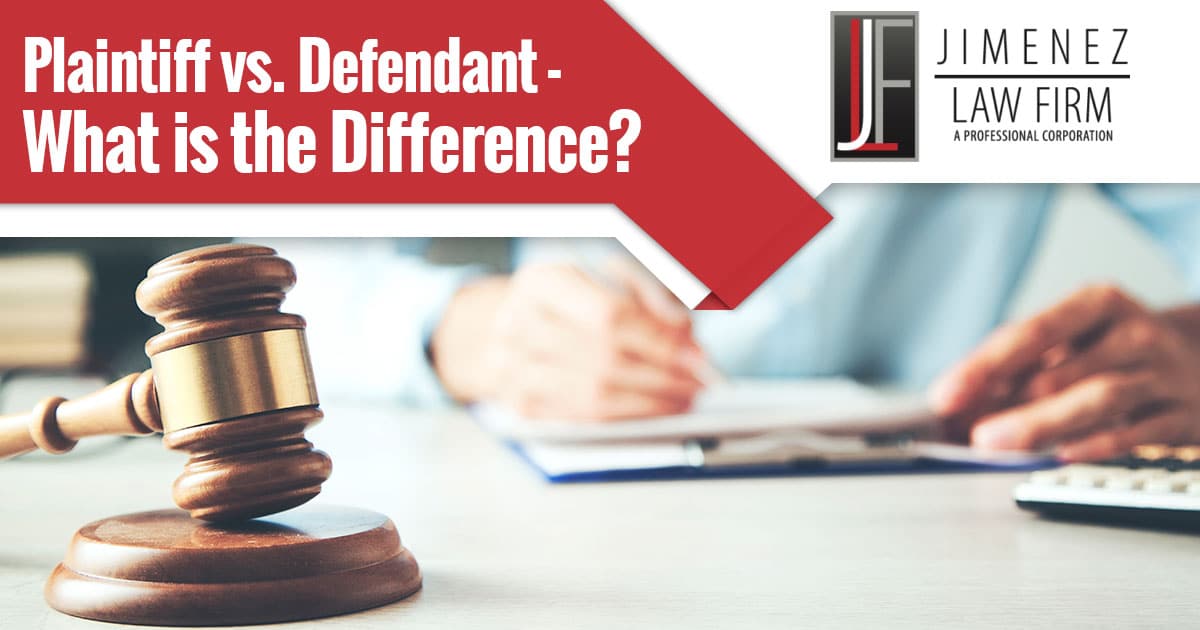Plaintiff vs. Defendant — What is the Difference?
When you need a lawyer’s services, it can be difficult to understand all the terms that get thrown around as you discuss your case. Two words used frequently are plaintiff and defendant. Understanding the differences between the two and when to use them is extremely important when talking about your case.
Learn how to use these legal terms correctly in a personal injury case
It is important to understand the terms mentioned when you are discussing your case. Many times, lawyers can use overly-technical language or “legalese” to explain different aspects of your legal matter.
Two of these terms that are used frequently are plaintiff and defendant. We are going to take a look at the key differences as well as when to use the terms properly.
What’s the difference between a plaintiff and a defendant?
The plaintiff is a person or entity that files a lawsuit. The lawsuit includes a complaint and a summons which must be filed in the appropriate court. The defendant the person or entity that is being sued.
Plaintiff and defendant are terms usually used in civil cases and/or a civil lawsuit. These can be anything from personal injury claims to negligence, to breach of contract, and family law cases.
In criminal cases, the person charged is still referred to as the defendant. However, the term plaintiff is replaced by complainant in most cases.
The plaintiff’s name is generally listed first while the defendant is named second. So, one can identify the parties by looking at the case name.
Remembering the difference
A simple way to remember the difference between the two terms is that defendant has the word defend in it. So, defendants must defend or be defended against any wrongdoing.
When you thinking of criminal defendants, OJ Simpson and Casey Anthony may come to mind. Both cases gained tremendous media attention where both defendants were acquitted of the murder charges they faced at trial.
The term plaintiff, is related to the verb complain. When someone complains or is a plaintiff, they have an issue that they want resolved.
A well-known case where the judge ruled in the plaintiff’s favor was Brown vs. Board of Education. In this case, the Supreme Court ruled unanimously that racial segregation of children in public schools is unconstitutional. The plaintiff, Oliver Brown, filed a class-action lawsuit against the Board of Education in Topeka, Kansas after his daughter was not allowed to attend all-white elementary schools.
The burden of proof
While making distinctions between the two terms plaintiff and defendant, it is important to know that in a civil case, the plaintiff generally has the burden of proof. This means that the plaintiff must prove the allegations.
The burden of proof in civil cases is usually preponderance of the evidence. This refers to the weight of the evidence, not the amount. The plaintiff must convince the judge or jury that there is a greater than 50% chance that the claim is true. In criminal cases, the charges must be proven beyond a reasonable doubt.
While the burden of proof lies with the plaintiff, the defendant must defend themselves against the accusations brought against them. If they can’t do that, they risk losing the case.
Other terms to know
When a case is appealed, the parties involved are seldom referred to as the plaintiff and defendant. The party appealing the ruling is called the appellant. The party responding to the appeal is called the appellee. It does not matter which side they were on in the original case.
If a plaintiff sues the defendant, the defendant can turn around and file a claim against the plaintiff. This is referred to as a “counterclaim”. When this happens, the defendant is called the “counter-claimant” or “counter-plaintiff”. The plaintiff can be referred to as the counter-defendant.
When you are entering a lawsuit, your attorney should explain any unfamiliar terms. Knowing the difference between plaintiff and defendant is a good way to start to build your legal vocabulary.
When you need legal advice, help with child support enforcement, or child custody contact a Family Law attorney from the legal professionals at the Jimenez Law Firm. Contact us here.

